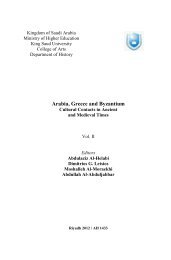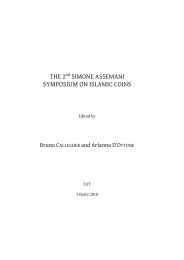ulum-al-quran
ulum-al-quran
ulum-al-quran
You also want an ePaper? Increase the reach of your titles
YUMPU automatically turns print PDFs into web optimized ePapers that Google loves.
Vol. 3, p. 631. Another reference to the Suhuf of Musa and Ibrahim is in Sura 53:36.]<br />
A reference to the Torah (Taurat) of Musa:<br />
'It was We who reve<strong>al</strong>ed the law (to Moses): therein was guidance and light ... We ordained<br />
therein for them: life for life, eye for eye, nose for nose, ear for ear, tooth for tooth and<br />
wounds equ<strong>al</strong> for equ<strong>al</strong>, but if anyone remits the ret<strong>al</strong>iation by way of charity it is an act of<br />
atonement for himself and if any fail to judge by (the light of) what God has reve<strong>al</strong>ed they<br />
are (no better than) wrongdoers' (Al-Qur'an 5: 47-8).<br />
A reference to the Ps<strong>al</strong>ms (Zabur) of Dawud:<br />
'And verily We have written in the Ps<strong>al</strong>ms, after the Reminder: My righteous slaves will<br />
inherit the earth' (Al-Qur'an 21: 105).<br />
A reference to the Gospel (Injil) of 'Isa:<br />
'Muhammad is the messenger of Allah. And those with him are hard against the disbelievers<br />
and merciful among themselves. Thou (O Muhammad) seest them bowing and f<strong>al</strong>ling<br />
prostrate (in worship) seeking bounty from Allah and (His) acceptance. The mark of them is<br />
on their foreheads from the traces of prostration. Such is their likeness in the Torah and<br />
their likeness in the Gospel like as sown corn that sendeth forth its shoot and strengtheneth<br />
it and riseth firm upon its st<strong>al</strong>k, delighting the sowers that He may enrage the disbelievers<br />
with (the sight of) them. Allah has promised, unto such of them as believe and do good<br />
works, forgiveness and immense reward' (Al-Qur'an 48: 29).<br />
The pre-Qur'anic scriptures, besides carrying the same basic message about Allah, the Master of the worlds, and man, His<br />
creation, <strong>al</strong>so brought specific instructions addressed directly to particular communities of people at given points of time<br />
in history and in particular circumstances, such as the Jewish or Christian communities. Revelation before the Qur'an, and<br />
hence scriptures before it, were in many of their details situation-oriented in nature and therefore confined to their<br />
particular frameworks. This <strong>al</strong>so explains the continuity of revelation. With changing circumstances and in different<br />
situations new guidance from Allah was required. As long as the revelation and scripture were not completely univers<strong>al</strong> in<br />
nature, revelation would not reach its fin<strong>al</strong>ity.<br />
The Fin<strong>al</strong> Revelation<br />
Muhammad was the last messenger from Allah to mankind, and he brought the fin<strong>al</strong> revelation from God to man.<br />
Therefore the scripture containing this revelation is the last of the Holy Scriptures.<br />
The basic message of the Holy Qur'an is the same as the basic message of the previous revelations and books, and the<br />
directives and instructions, by which it provides guidance for man are of a univers<strong>al</strong> nature. They apply for <strong>al</strong>l times to<br />
come and in <strong>al</strong>l situations. This revelation corresponds to man's position on earth and in history. Man has reached, in his<br />
development, the stage when univers<strong>al</strong> principles need to be applied to safeguard his purposeful existence.<br />
THE QUR'AN, HADITH AND HADITH QUDSI<br />
The Qur'an<br />
The Qur'an can be defined as follows:<br />
The speech of Allah, sent down upon the last Prophet Muhammad, through the Angel Gabriel, in its precise meaning and<br />
precise wording, transmitted to us by numerous persons (tawatur), both verb<strong>al</strong>ly and in writing.<br />
The word Qur'an<br />
The Arabic word 'qur'an' is derived from the root qara'a, which has various meanings, such as to read, [Sura 17: 93.] to<br />
recite, [Sura 75:18:17: 46.] etc. Qur'an is a verb<strong>al</strong> noun and hence means the 'reading' or 'recitation'. As used in the<br />
Qur'an itself, the word refers to the revelation from Allah in the broad sense [Sura 17: 82.] and is not <strong>al</strong>ways restricted to<br />
the written form in the shape of a book, as we have it before us today.<br />
However, it means revelation to Muhammad only, while revelation to other prophets has been referred to by different<br />
names (e.g. taurat, Injil, kitab, etc.).





